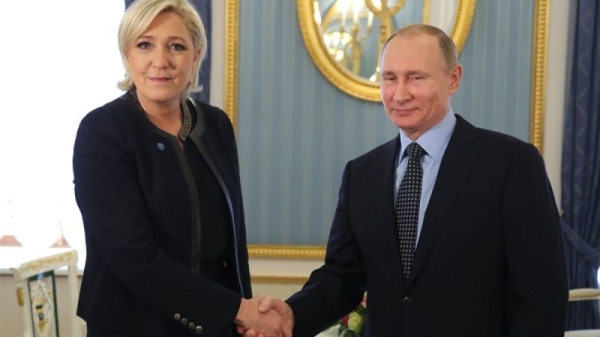French parliament report points to far-right’s special ties with Russia

Marine Le Pen’s far-right party formed a special relationship with the Russian regime as both parties gradually got closer on policy, geopolitics and values, according to a parliamentary report set to be published on Monday.
The committee of enquiry into foreign interference in French political, economic and financial life was launched by Le Pen’s Rassemblement National (RN) in September of last year, only to be used against her party to look into its links with Russia.
The report, according to information revealed by Mediapart and franceinfo and confirmed to EURACTIV, was submitted to a vote by committee members by Renaissance rapporteur Constance Le Grip on Thursday.
However, according to the information confirmed to EURACTIV by parliamentary sources close to the file, the report details the links between Russia and Le Pen’s far-right party formerly known as Front National (now Rassemblement National) and a “convergence” with the Kremlin’s positions.
Russian rhetoric
According to the report, Rassemblement National is ” totally aligned with Russian rhetoric”.
Le Pen and her party’s position on Crimea is in line with that of Russia, said Le Grip, pointing to Le Pen calling Crimea “Russian” despite Western consensus on the issue.
Le Pen’s position was “reiterated during her hearing by the committee of enquiry, [which] take up word for word the official language of Putin’s regime”, she added.
https://www.euractiv.com/section/politics/news/le-pen-insists-crimea-is-russian/
Moreover, the report also notes, “Russian press titles were delighted to echo [this] assertion”, which shows that Le Pen and her party are an “effective transmission belt” for Kremlin propaganda.
The report recalls Le Pen’s opposition to then-president François Hollande’s decision to cancel the sale of military vessels (ships, helicopters) in 2015, about a year after the annexation of Crimea by a puppet referendum.
However, the report acknowledges “a softening of the pro-Russian stance taken by the Rassemblement National and Ms Le Pen” from when Russia invaded Ukraine in February 2022.
Travels to Russia, occupied Crimea and the Donbas by Rassemblement National officials before the war in Ukraine – including MEPs Thierry Mariani and Philippe Olivier – are also highlighted.
During an observation mission, former MEP Hélène Laporte, now vice-president of the French National Assembly, praised the 2020 constitutional referendum in Russia, which enabled President Vladimir Putin to extend his stay in power as “a lesson of democracy”.
The Russian loan
Throughout the hearings, the committee members sought, in particular whether the €9 million loan taken out by the Front National in 2014 from a Russian bank could have influenced the party’s positions. Le Pen denies this, arguing that she was forced to seek funding outside Europe.
The report considers that Le Pen was “evasive about her recollections” and “not very curious” about the origin of the funds – a sentiment shared by several committee members contacted by EURACTIV.
After a documentary check by Tracfin, the National Committee of electoral campaign accounts and the economic intelligence services, the rapporteur points out that no guarantee was provided by the Front National (FN) to the lender – contrary to usual practice. Therefore, rescheduling the loan repayment constitutes a “definite and substantial advantage”.
The report also questions “the motives behind the granting of these loans by Russian institutions to the FN and then to the RN, when the party has repeatedly shown its support and closeness to the Russian authorities”. The text also highlights the votes of RN MEPs “systematically” aligned with the pro-Russian position.
After the first leaks to the press on Thursday, Le Pen denounced “a political trial” and a “dishonest and totally politicised” report, in which “there is nothing”, reported AFP. The RN MPs on the committee also voted “against” the report.
In any case, the report refers to Russian influence on political figures from different political sides and a “privileged” relationship between the Russian regime and Le Pen’s RN.
This is explained above all by the “strong convergence of views with the Russian government on a certain number of political values and geopolitical issues”. The report describes a “strategy of political and ideological rapprochement” that was “structured and accelerated” when Le Pen was elected FN president in 2011.
In addition to the French case, Russia is also accused of influencing other European parties. In Italy, Matteo Salvini’s Lega (also affiliated to ID) is the only European party to have sealed a “collaboration” agreement with United Russia, Vladimir Putin’s party. At this stage, it is still unclear whether the agreement has been terminated, since it provided for tacit renewal, and could therefore still be in force.
(Davide Basso | EURACTIV.fr)
Read more with EURACTIV




